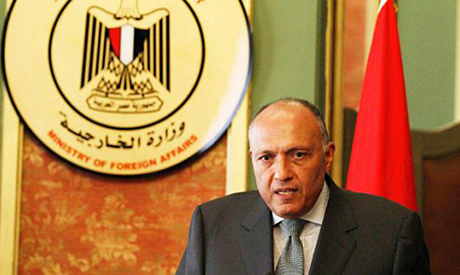
Egyptian Foreign Minister Sameh Shoukry (Photo: Reuters)
A fresh round of talks in Khartoum between Egypt, Ethiopia and Sudan on the specification of the Grand Ethiopian Renaissance Dam have not yielded significant results, Egyptian Foreign Minister Sameh Shoukry said on Friday.
Egyptian Irrigation Minister Mohamed Abdel-Ati and the acting head of General Intelligence, Abbas Kamel, arrived in Khartoum on Wednesday along with Shoukry to discuss outstanding issues regarding the hydroelectric project with their Ethiopian and Sudanese counterparts.
This round of talks was aimed to resolve an impasse in negotiations over studies conducted to determine the impact of the dam on the downstream countries of Egypt and Sudan.
"All the issues that may have led to a deadlock in the past have been discussed leading us to a roadmap to address any obstacles in the future," Shoukry said, adding however that the current round of talks had not yielded any significant results that could be announced.
"We will continue to comply with the instructions of political leaders in our countries to break this deadlock, during the upcoming one-month period starting from 5 April to 5 May," he added, describing the talks as "comprehensive and transparent."
The current talks were originally scheduled to take place in late February after the leaders of the three countries agreed to set a one-month deadline to discuss how to end the stalemate, but the meeting was postponed upon Ethiopia's request following the resignation of its prime minister.
On Friday, Sudanese Foreign Minister Ibrahim Ghandour admitted that the talks had failed to achieve any significant results, adding that the ministries of irrigation in the three countries will hold further meetings to look into the technical disagreements.
“We sat for long hours, discussing many issues, but we failed to reach a joint decision regarding our differences," Ghandour said.
The Ethiopian government began construction of the Grand Renaissance Dam on the Blue Nile near the border with Sudan in 2011, as part of a development plan aimed at eradicating poverty and generating electricity.
In the past seven years, Egypt, Ethiopia and Sudan have held several rounds of talks on the dam’s anticipated impact on Nile water resources.
Egypt has expressed concern the dam could adversely affect its share of Nile water.
Short link: